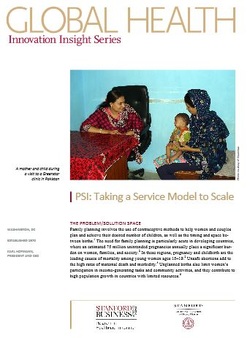 This Academic Case Study by Stefanos Zenios, Lyn Denend, and Stacey McCutcheon is published by Stanford Graduate School of Business 2013 - this introduction is reprinted by permission. The entire suite of articles may be found: Full Paper: http://csi.gsb.stanford.edu/psi-i-taking-service-model-scale Secondary story on PSI: http://csi.gsb.stanford.edu/psi-ii-changing-perceptions-and-behaviors Full Health Innovation Insight Series: http://csi.gsb.stanford.edu/global-health-innovation-insight-series Global Health Innovation Guidebook: http://csi.gsb.stanford.edu/sites/csi.gsb.stanford.edu/files/GlobalHealthInnovationGuidebook_2.pdf Population Services International (PSI) was founded in 1970 as a nonprofit organization focused on improving reproductive health in developing countries using commercial marketing strategies. Over the years, PSI broadened its mission to address family planning, child and maternal health, and HIV and AIDS prevention, screening, and treatment. As part of ongoing efforts to provide critical health services in developing countries, PSI sought to address the high unmet demand for family planning in Pakistan. Based on the organization’s earlier work in Pakistan, PSI knew that the majority of low-income women sought healthcare services from the private sector. Yet, despite being better equipped than public healthcare facilities, these private providers were generally not delivering family planning services. PSI learned that the financial incentives were low and that few providers actually had the necessary training and skills to counsel clients, perform IUD insertions, or prescribe pills or injectables. As a major NGO with a wealth of accumulated experience and significant resources at its disposal, PSI had the knowledge and ability to provide training to physicians. However, in order to educate enough providers to make a meaningful difference in a country with a population of more than 176 million, it would need to scale its training program quickly. This required devising a compelling business model with incentives to motivate qualified providers to participate. The second challenge to successfully achieving scale would be raising the awareness and visibility of the trained providers so that Pakistani women could find them. This mini-case study describes how PSI devised and implemented a social franchising model to rapidly address these needs and achieve scale in the target communities. [Read Case] |
Blog Team
Posts on our blog are contributed by a team of professionals dedicated to developing valuable resources for the Social Sector Franchising community. Archives
May 2024
|

 RSS Feed
RSS Feed
